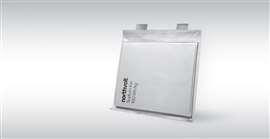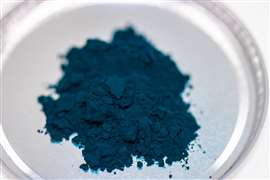Northvolt introduces sodium-ion battery cells
21 November 2023
 Sodium-ion cell from Northvolt (Photo: Northvolt)
Sodium-ion cell from Northvolt (Photo: Northvolt)
Battery developer and manufacturer Northvolt has announced the addition of new sodium-ion cells to its product portfolio.
Intended for energy storage solutions (such battery electric storage systems, or BESSs), the new cells are reported to have an energy density in excess of 160 watt hours per kilogram, as validated by the company’s Northvolt Labs in Västerås, Sweden.
Produced using iron and sodium, the new cells are said to be safer, more cost effective and sustainable than conventional nickel, manganese and cobalt (NMC) or iron phosphate (LFP) chemistries.
The cells use a hard carbon anode and a Prussian white (PW) cathode. PW is a reduced and sodiated form of the pigment more commonly called Prussian blue. As such, the cells have no lithium, nickel, cobalt or graphite.
In other material, Northvolt noted that the cells have an ‘exceptionally high cycle life’, and ‘a robust design and deep discharge capability allowing safe, easy handling’.
 Prussian white makes up the cell cathode (Photo: Northvolt)
Prussian white makes up the cell cathode (Photo: Northvolt)
Peter Carlsson, CEO and co-founder of Northvolt, commented: “The world has put high hopes on sodium-ion, and I’m very pleased to say that we’ve developed a technology that will enable its widespread deployment to accelerate the energy transition. It’s an important milestone for Northvolt’s market proposition, but battery technology like this is also crucial to reach global sustainability goals, by making electrification more cost-efficient, sustainable and accessible worldwide.”
Developed in partnership with Altris, the cells will feature in Northvolt’s next-gen energy storage solutions. The low cost and high-temperature stability is said to make the tech particularly attractive in India, the Middle East and Africa.
In addition, the tech can be made with locally-sourced materials, which could potentially create a pathway to local battery manufacturing capacity.
While the first-gen cells are to be used for energy storage, it is anticipated that later generations with still higher energy densities will be used for mobility solutions.
The first sample cells for ‘selected customers’ will be shipped in 2024.
STAY CONNECTED




Receive the information you need when you need it through our world-leading magazines, newsletters and daily briefings.
POWER SOURCING GUIDE
The trusted reference and buyer’s guide for 83 years
The original “desktop search engine,” guiding nearly 10,000 users in more than 90 countries it is the primary reference for specifications and details on all the components that go into engine systems.
Visit Now
CONNECT WITH THE TEAM










